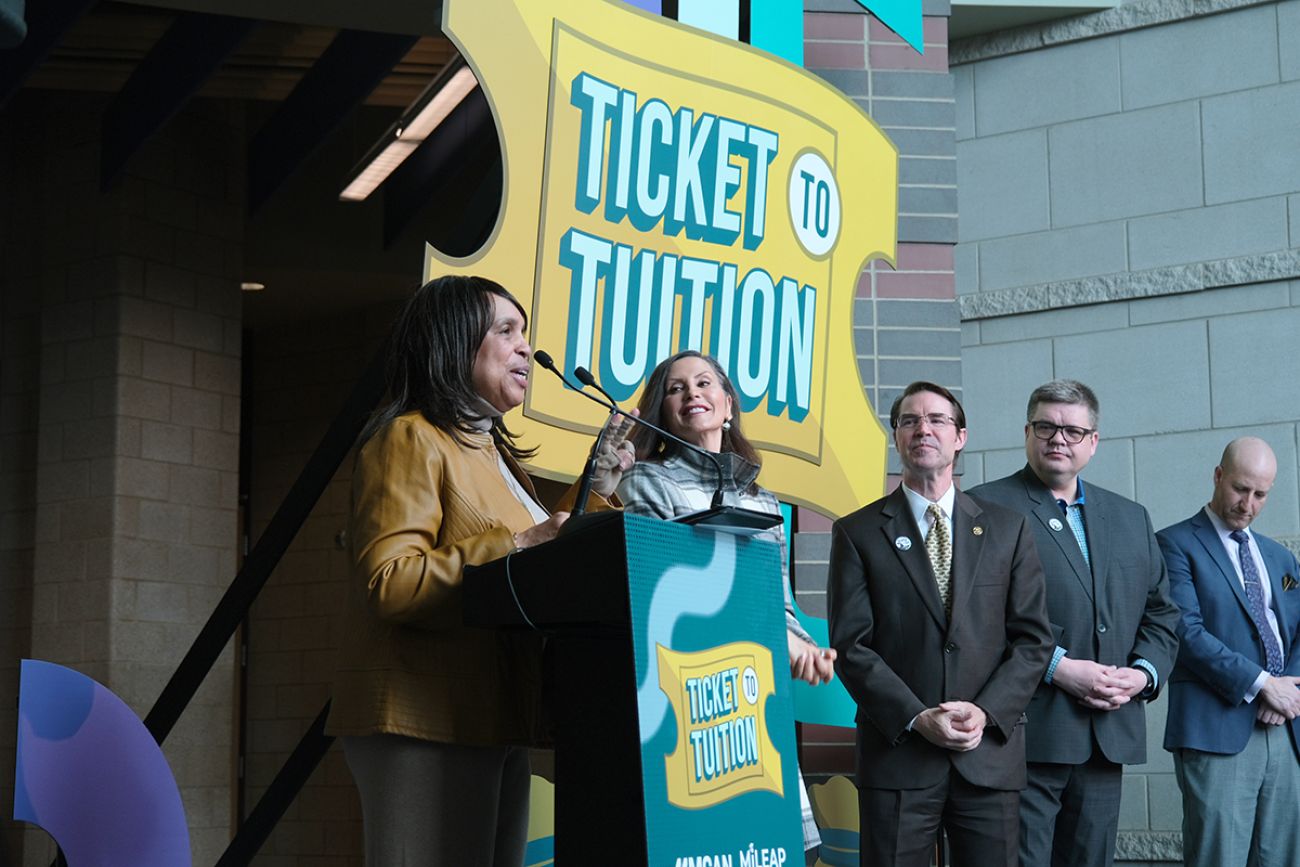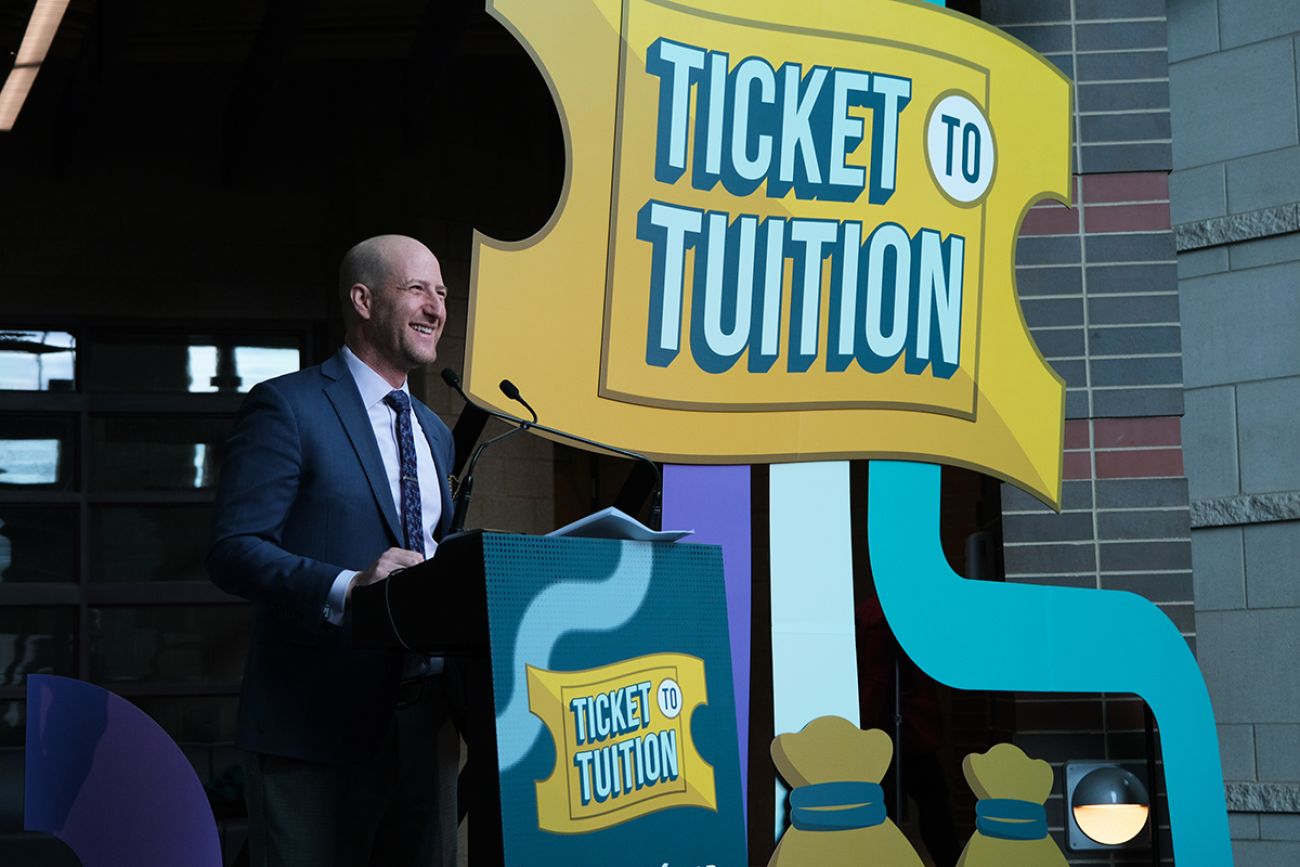Michigan’s new tool to boost college enrollment: $50K prizes. Will it work?

- Michigan students who fill out the Free Application for Federal Student Aid (FAFSA) could win $50,000 to pay for school
- The federal funds unlocks college grants, scholarships, work study opportunities and loans
- The state is trying to raise the rate of adults who have a college degree or skills certificate
Free pizza hasn’t worked. Nor have deep discounts and even free tuition. Now, Michigan is turning to the promise of cold hard cash in an effort to bolster stagnant college enrollment numbers.
On Tuesday, Michigan officials announced a sweepstakes, the Ticket to Tuition, that will award up to $50,000 in college funds if they fill out the Free Application for Federal Student Aid (FAFSA).
“I encourage all high school seniors who want to go to community, private, or public college to fill out their FAFSA, save thousands of dollars while attending school and enter to win our sweepstakes,” Whitmer said in a statement.
The competition is the latest in a series of state efforts to boost college enrollment and decrease college costs. Whitmer has set a goal of getting 60% of Michigan working age adults with a skills certificate or college degree by 2030. The state is at 51.8%.
Michigan has an aging population, and leaders have emphasized that more college degree earners means better long-term prospects for the state.
The state has college aid programs for recent high school graduates and adults who do not have a college degree. These programs were passed with bipartisan support but so far, schools have not seen major enrollment gains.
Related:
- Whitmer wants more men in Michigan colleges and job training. What to know
- 70 international students face deportation in Michigan. Trump won't say why
- In debt and in limbo: Uncertain times for student-loan borrowers in Michigan
About 53.4% of the Michigan high school class of 2024 attended college within six months of graduation. That’s down from 62.2% pre-pandemic.
The state spent roughly $375.4 million in the 2023-2024 school year to support students in all state-funded aid programs administered by the Michigan Department of Lifelong Education, Advancement, and Potential, according to a recent state report. These funds were used for 117,336 students.
But getting these state funds typically requires filling out the federal form, which sometimes gets a bad rap for being complicated or time consuming. The federal government tried to simplify the form last year, but doing so caused significant delays and errors.
Taxpayers are paying for the sweepstakes: The $980,000 program is part of the $82.5 billion state budget.
How does the FAFSA work?
High schoolers and adults planning to attend college fill out the online or paper form with financial information. Colleges and universities use the information to determine if students qualify for scholarships or grants.
Students and their families may also qualify for loans that do require repayment. Filling out the FAFSA does not automatically commit a student to taking out loans.
In Michigan, the FAFSA is also used to determine if a student qualifies for the Michigan Achievement Scholarship. For the class of 2025, students with any family background can qualify for community college tuition-free or significantly discounted.
For students who meet certain income requirements, they can receive funds to attend a private college or public university in the state.
How many complete the FAFSA in Michigan?
Nearly 51,000 students have already completed the form, according to the National College Attainment Network’s FAFSA Tracker. That’s an estimated 43% of the Michigan high school graduation class.
“More than 7,300 students” entered last year’s FAFSA competition for free pizza, according to an August 2024 news release from the Michigan Department of Lifelong Education, Advancement, and Potential.
Roughly 53% of the high school class of 2024 filled out the form by the end of 2024.
State leaders have considered but abandoned plans to make FAFSA mandatory.
Lawmakers considered a bill last session that would have required the class of 2028 and beyond to submit the FAFSA or an “opt-out” form to graduate high school.
OK, so how do I enter this competition?
Michigan residents who fill out the FAFSA for the first time to be used for the 2025-2026 school year are eligible.
The Michigan College Access Network is working with the state to give away $900,000 in prizes.
For example, this could include a high school senior planning to go to college in the fall.

It could also mean an adult who is choosing to go to college for the first time next school year. (The state has the Michigan Reconnect program which pays in-district tuition for adults 25 and older to attend community college.)
They must fill out the FAFSA. Then, the student enters the state competition by texting “CASH” to 1-855-505-8425 and completing the form texted to them.
A student can also apply by mail with mailing information on the competition website.
Entries must be submitted by May 16.
How do the prizes work?
There are two types of prizes:
- $10,000 prize (40 winners)
- $50,000 prize (10 winners)
The fund will be deposited into a Michigan Education Savings Program (MESP) account, which can be used for qualified education expenses. You can learn more about the MESP here.
Do these incentives work?
It’s unclear.
Research has shown that onetime incentives or lotteries are better at getting people to do something once — like filling out FAFSA — rather than changing behaviors.
Michigan and several other states used cash incentives of up to $2 million to try to boost COVID-19 vaccinations in 2021. While vaccination rates rose during the contest, researchers have found that states with lottery incentives did not have significantly higher vaccination rates than states without them.
Michigan Education Watch
Michigan Education Watch is made possible by generous financial support from:
Subscribe to Michigan Education Watch
See what new members are saying about why they donated to Bridge Michigan:
- “In order for this information to be accurate and unbiased it must be underwritten by its readers, not by special interests.” - Larry S.
- “Not many other media sources report on the topics Bridge does.” - Susan B.
- “Your journalism is outstanding and rare these days.” - Mark S.
If you want to ensure the future of nonpartisan, nonprofit Michigan journalism, please become a member today. You, too, will be asked why you donated and maybe we'll feature your quote next time!






